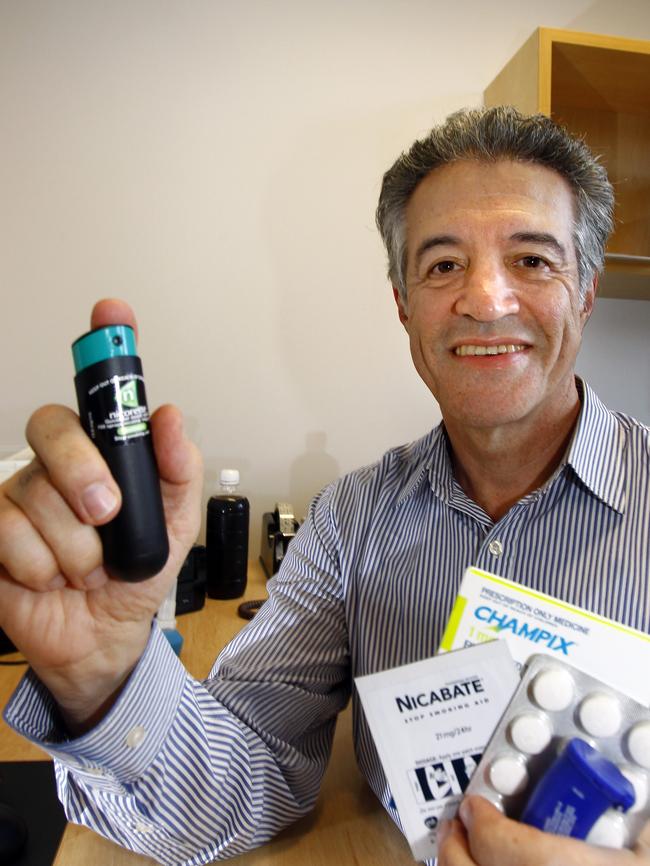James Paterson: We’re making it harder for smokers to quit
THE rest of the world is embracing e-cigarettes but in Australia the focus is still on tobacco abstinence, writes James Paterson.
Opinion
Don't miss out on the headlines from Opinion. Followed categories will be added to My News.
E-CIGARETTES have been a powerful tool for reducing smoking around the world. They could be in Australia too, if we let them. Public education and policy changes have reduced Australian smoking rates from 25 per cent of the population in 1993 to 12.2 per cent in 2016. But the rate of decline has slowed in recent years, even as excise taxes continue to increase.
NEW VICTORIAN SMOKING LAWS BANNING SMOKING IN OUTDOOR DINING AREAS COMING INTO EFFECT
According to the latest figures from the Australian Institute of Health and Welfare, released in June, there was no statistically significant fall in smoking rates among people aged 14 and over between 2013 and 2016. In contrast, smoking rates in the United Kingdom and United States declined considerably.
In the UK, smoking rates of people aged 18 and over fell from 18.8 per cent in 2013 to 15.8 per cent in 2016. In the US, smoking rates fell from 17.8 per cent to 15.8 per cent over the same period.
One major factor that explains this difference is the treatment of e-cigarettes and other electronic nicotine delivery systems. Unlike in Australia, where the sale of nicotine e-cigarettes is illegal and their importation requires a medical prescription, they are legal and increasingly popular in both the UK and the US.

That has significantly benefited people attempting to quit smoking.
Public Health England — the government’s own public health organisation — says e-cigarettes “have quickly become the most common aid that smokers ... use to help them stop smoking”.
Of the 2.5 million people who attempted to quit smoking in 2015, more than one million used an e-cigarette, far more than the 700,000 people who used a licensed nicotine replacement product such as patches or gum. It helped make 2015 the most successful year for people quitting smoking in the UK on record. The Centres for Disease Control reported similar findings in the US, with 35 per cent of Americans who tried to quit in 2014-16 using e-cigarettes as a substitute for smoking — more than any other device. According to recently released research by the National Institute of Health, “the increased use of e-cigarettes … was associated with a statistically significant increase in the smoking cessation rate”.
The Australian parliament is now inquiring into the use of and marketing of e-cigarettes. Of the 332 submission received, 285 were clearly in favour of legalising e-cigarettes (only 17 were clearly against). Those included submissions from leading healthcare professionals, such as tobacco treatment specialist Dr Colin Mendelsohn, as well as dozens of personal stories from people who have used e-cigarettes to successfully quit. Unfortunately, some anti-tobacco activists and public health academics appear to be unwilling to accept anything less than an abstinence-only approach. A quote from one such activist led to a scaremongering article on the front page of The Age, which cited the overwhelming support for e-cigarettes on an evidence of an “astroturfing” campaign by Big Tobacco.

The article claimed “health groups” fear e-cigarettes could become a “gateway drug” to smoking, despite evidence showing e-cigarettes reduce smoking rates. It also quoted the National Health and Medical Research Council’s claim that “there is insufficient evidence … e-cigarettes are safe”.
That mirrors the cautious approach of the Therapeutic Goods Administration, which rejected a proposal that would have exempted low concentrations of liquid nicotine from the poisons standard last February. Among the key reasons for the TGA’s decision was the lack of evidence about the long-term use of e-cigarettes.
No product is perfectly safe and no evidence exists to measure the health effects of long-term e-cigarette use — they haven’t been around long enough. But the evidence that does exist shows that e-cigarettes are overwhelmingly safer than traditional smoking.
IN A 2015 review of all available evidence, Public Health England’s expert panel estimated e-cigarettes “are around 95 per cent safer than smoking”.
That estimate has been echoed by the Royal College of Physicians, whose 2016 report states that “the hazard to health arising from long-term vapour inhalation is unlikely to exceed 5 per cent of the harm from tobacco smoke”. That is because most of the harm from smoking comes from the harmful properties of smoke, which do not exist in the vapour of e-cigarettes.

The UK Government considers the evidence in favour of e-cigarettes to be so overwhelming that its new Tobacco Control Plan pledges to “maximise the availability of safer alternatives to smoking” such as e-cigarettes.
That is the approach Australia should adopt. If we demand definitive proof that e-cigarettes are harmless, we will prevent potentially thousands of people from switching from traditional smoking to a far safer alternative.
We have an opportunity to embrace a new technology that has proven to be a popular and successful aid to help people quit smoking. We shouldn’t pass up this opportunity to save lives.
James Paterson is a Liberal Senator for Victoria



